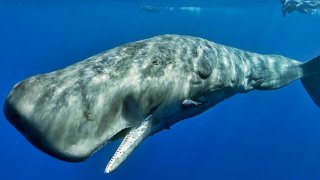Russia’s “Spy Whale” Hvaldimir Found Dead in Norwegian Waters
Hvaldimir, the beluga whale suspected of being a Russian spy due to his harness and proximity to Russia's Northern Fleet, was found dead in Norwegian waters.
Summary and Key Points: Hvaldimir, the beluga whale suspected of being a Russian spy due to his harness and proximity to Russia's Northern Fleet, was found dead in Norwegian waters.
-First spotted in 2019 with a Russian-made camera, the whale became a local celebrity, fueling rumors of Russian military involvement in training marine mammals for intelligence gathering.
-Hvaldimir was estimated to be just 15 years old, young for a beluga whose lifespan can exceed 60 years. While no visible injuries were found, the cause of death is under investigation.
-The Kremlin never confirmed if Hvaldimir was a trained asset, despite Russia’s history of using marine mammals for military purposes.
Whale of a Tale – Russian Spy Whale Found Dead
It has the makings of a Cold War spy thriller – a Russian spy was found dead, floating in the waters of a NATO member-state. But in this case, the death of the alleged spy is less thriller and more a simple tragedy.
That's because the "spy" was a white beluga whale.
Known as Hvaldimir – a combination of the Norwegian word for whale, hval, and the first name of Russian President Vladimir Putin – the whale became a regional celebrity after he was first spotted with a harness in 2019, leading to the rumors he might be a Moscow spy. That harness carried a Russian-made camera.
The fact that he was spotted in Norwegian waters about 260 miles from Murmansk, homeport of the Russian Navy's Northern Fleet, further fueled speculation that the aquatic mammal was trained by the Russian military.
The body of the whale is being brought to Norway for investigation. Hvaldimir's age was estimated to be just 15, which is young for Beluga whales, whose lifespan can surpass 60 years. However, there was no sign of obvious injuries, the BBC reported.
"It is with heavy hearts that we share news of Hvaldimir's passing," the non-profit Marine Mind, which has tracked the whale's movements for years, posted on its Facebook page over the weekend.
"Hvaldimir was not just a beluga whale; he was a beacon of hope, a symbol of connection and a reminder of the deep bond between humans and the natural world," the group added. "Over the past five years, he touched the lives of tens of thousands, bringing people together in awe of the wonders of nature. His presence taught us about the importance of ocean conservation, and in doing so, he also taught us more about ourselves."
The Kremlin never acknowledged whether the Beluga whale was a Russian agent. But Moscow has trained marine mammals for intelligence gathering, and whale pens have been identified near the Northern Fleet's naval base.
There were also reports in June 2023 that Russia had been training "combat dolphins" to help counter enemy divers near Crimea. The UK's Ministry of Defense reported that floating mammal pens for bottlenose dolphins were present at the Black Sea Fleet's naval base in Sevastopol.
As CBS News reported last year, "Both the Soviet Union and the United States used dolphins during the Cold War, training them to detect submarines, mines and spot suspicious objects or individuals near harbors and ships."
The U.S. Navy also studied Beluga whales in the 1950s while researching hydrodynamics as part of its efforts to develop more streamlined submarines. The effort was largely unsuccessful.
Author Experience and Expertise: Peter Suciu
Peter Suciu is a Michigan-based writer. He has contributed to more than four dozen magazines, newspapers, and websites with over 3,200 published pieces over a twenty-year career in journalism. He regularly writes about military hardware, firearms history, cybersecurity, politics, and international affairs. Peter is also a Contributing Writer for Forbes and Clearance Jobs. You can follow him on Twitter: @PeterSuciu. You can email the author: [email protected].
Image Credit: Shutterstock.


